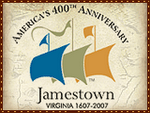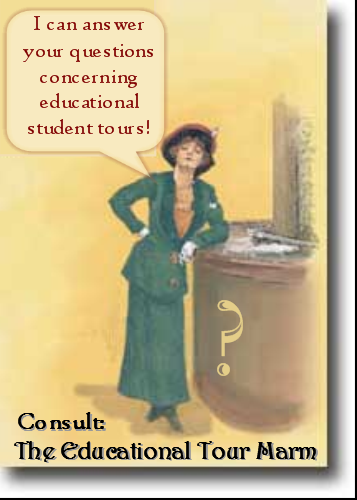Educational Student Tour Company Ethics - Caveat Emptor

Looking for a student tour company? Read this first.
If you've stumbled upon this, you might be seriously looking for a tour company for your school or class. Perhaps you have never traveled, or perhaps you've been dissatisfied. In any case, I would suggest that you read this over first before you contract a company so you understand the differences amongst the types of company and services. The second part concerns ethics and honesty.
There are three types of tour providers for students: Educational Student Tours, Student Tour Operators, Travel Agencies.
Student tour operators, whether they have 'educational' or 'academic' in their name are mostly in business to move students. The educational content comes from either the teacher or through the process of osmosis at the sights themselves. Very often there is no 24-hour guide dedicated to the group introducing the sights or providing running commentary on the bus rides. In major cities, a step-on city guide is provided for about 4-6 hours. Teachers are provided with tickets, checks and coupons and normally need to find their own way to places. The itinerary is a standard one and generally there are several groups from that operator following the same itinerary , staying in the same hotel, and eating at the same restaurants. This has been the choice with teachers who simply want a package and let the company run the sightseeing program.
Travel agencies provide an escort to pay bills, follow a standard itinerary, and pick up city guides for four-six hours to give a city tour. They give more service and might even find some interesting restaurants etc., but tend to know less about the areas logistics, and educational content.
Educational student tour companies are full service and help the teacher/organizer plan the trip according to the school's curriculum, standards, teaching plan, and objectives. They contract fully-qualified educational tour guides who stay with the group for the entire program (including the hotel) and are responsible for educational content as well as the logistics etc. in the field. No two programs are alike. They needn't cost more than the large companies because they typically don't have the high profit margins required by the venture capitalists who own them, but they give better value. The travel agencies' quality does vary according to the expertise of the agent and the type of hotel etc.
Naturally, I am a passionate advocate of full-service educational student tours.
In 1981, I joined one of the pioneers of educational student travel. It was a company called Educational Field Studies and it was started by educators who thought that most student field trips were just sightseeing excursions and they wanted to raise the bar.
During those years we all strove to include as much educational content as possible without losing the 'fun factor'. Various teachers I worked with required specialized programs that reflected their respective teaching plans and objectives. We were the first company to get accreditation. And the owners of the company initiated and helped push through a bill in California to protect student travelers from unscrupulous tour operators and travel agencies.
Unfortunately, the days of educational content-driven travel programs almost came to an end with the sale of Educational Field Studies upon the retirement of the owners as well as several smaller companies that went out of business as a direct result of September 11th.
The larger student tour conglomerates now rule the industry and provide generic itineraries and perfunctory sightseeing packages under the guise of 'education'. These are simply student tours.
If you haven't traveled with a fully qualified 24-hour teacher/guide (not an escort and city step-on guides) throughout your entire trip, if you are not offered hands-on activities or special programs for your group, if alternate venues that enhance or complement your teaching plan are not suggested, and if simple requests are either too difficult to arrange or denied, then it is not a truly educationally-based company.
When school groups started to travel after September 11th, most of them were much smaller and had to combine with other schools in order to be able to afford to travel. Many of the teachers who were accustomed to the 'normal' student tours were combined with the groups that had always been with the full-service company. The difference in the quality and educational content was astounding to them and afterwards they requested the 24-hour guides etc. Unfortunately, the company was phasing out the 24-hour guides and would not honor their requests.
Additionally, many of the salespeople for the large companies and agencies are ignorant about history, curricula, and standards. One of my Principals recently contacted such a company to run a literary tour in California centered around John Steinbeck. The salesperson who had been with that company for over ten years and lived in California , asked, "Who's Steinbeck?", and proceeded to send three 'custom' sightseeing itineraries of San Francisco and Marine Science in Monterey. (I have since designed a three day trip for him.) Another teacher I had worked with was shopping around for companies, as she always does each year to see what is in the marketplace (always a good idea). She requested a 'Marquis de Lafayette' as a dinner guest and two salespeople from different companies did not know who he was! One did get back to her and said that they couldn't do it! She is back with me, and this will be our fourth year together and yes, she will have Lafayette as a dinner guest. (I never take my clients for granted!) Try asking salespeople what specific educational programs and sites are available through their respective companies to illustrate the Fugitive Slave Act of 1850 or the Industrial Revolution , and wait for the response!
Incredibly, several tour companies run their operation like a sleazy car dealership: They lure you into a trip with a very cheap pricetag and during the course of the planning, one finds the price rising with each component one thought was included. Some also require you to tip the escort and driver. (Full service companies include all the tips etc. and the gratuity is completely discretionary.) Some of these companies raise the price a month or two before the trip and use the airlines or fuel surcharges as an excuse! (A good company understands the trends and includes that in the initial proposal.) Some companies make promises they cannot or will not keep and there are unpleasant 'surprises' the minute one arrives at the airport because they put too much into the itinerary so it will look good; the itineraries are logistically impossible or impractical, and several sights are dropped or canceled in the field as a result. Some itineraries don't include inside visits that needed appointments beforehand which were not communicated to the teacher; hence, one gets to see Daniel's Story when one really wanted to see the permanent exhibit at the National Holocaust Memorial Museum.
And then there is the ugliness concerning teachers being bribed by student tour companies to travel with them which deprives students of a more robust program because of the amount of money going into the teacher's pockets.
The teacher/organizer should be in absolute control of the program content, not the company. Set a budget and have the company work with you to design a tour around it. Ask lots of questions. Prioritize. Be sure to pin the company down concerning names and locations of hotels and restaurants within a month of booking your trip, not two weeks before the trip! Make sure your lunches are not 'appointments' that limit flexibility in the schedule should there be an added appointment to a site i.e. Capitol or unforeseen situations.. (I prefer giving out cash or arranging for box picnic lunches.)
The company ought to provide a representative to meet with parents at the school to discuss the trip in detail and answer technical questions.
Remember the organizer is held responsible by the school district, administration, parents, and students for the success of the trip. It is your responsibility to be able to answer all questions regarding the trip well before you travel.
I would strongly suggest that one not depend solely on the company's or school district's insurance, but take out a modest group policy for the students that all must purchase. Travelex and Travelguard are the two best companies for this. Companies should not be self-insuring, which is illegal in most places. Many companies have merely a 'fund' and the coverage is arbitrarily decided; normally it doesn't include pre-existing conditions; emergency evacuation; airline delay and cancellation; missed day and sights due to airline delays; lost luggage; nor has a terrorism clause. Read the fine print. Whenever I see a group sleeping in an airport terminal, I know that the company did not protect the group and/or the group did not take out travel insurance. None of my groups have ever slept in an airline terminal despite cancellations due to weather etc.
There are a couple of companies that do offer custom educational programs and will work with you to design a truly responsive program. The salespeople are educators and travel professionals that keep abreast of curriculum-based programs at various museums and other sites, They contract people like me who are dedicated to creating unique cutting edge experiences. It takes a bit of research and the right questions to find the right company, but it is well worth the effort.

















